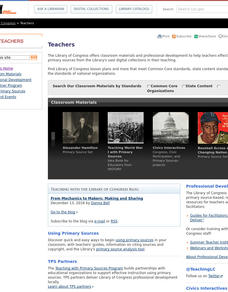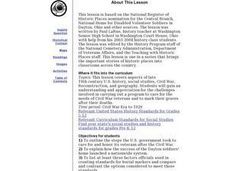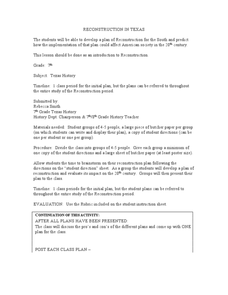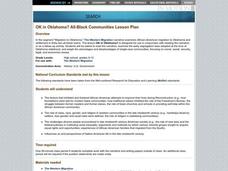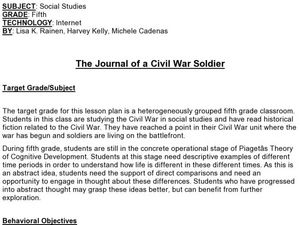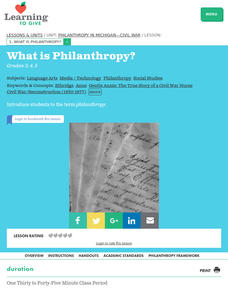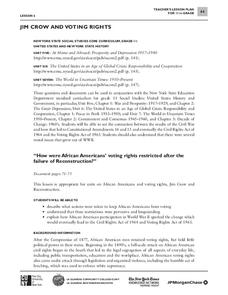Facing History and Ourselves
Defining Freedom
The Emancipation Proclamation freed slaves in the Confederate states. The Thirteenth Amendment banned slavery in the United States. However, neither document defined freedom. The second lesson in the Reconstruction Era series examines...
Facing History and Ourselves
A Contested History
Memories of and interpretations of history change—that's the key takeaway from a lesson that has young historians compare the story of the Reconstruction Era as told by the historians of the Dunning School to the view of scholars today...
US House of Representatives
Hispanic Congressional Representation in the Era of U.S. Continental Expansion, 1822–1898
From the Louisiana Purchase to the Spanish-American War, the history of the United States is intertwined with the story of Hispanic Americans. Using an article about Hispanics in Congress during the 1800s, learners research their lives...
Curated OER
Emancipation Proclamation
Students analyze key components of a portrait and relate the elements to the historical context. In this lesson students evaluate the "Emancipation Proclamation" and it's significance.
Curated OER
Primary Source Adventures: Runaway Slaves Lesson Plan
Fourth graders examine social changes in Texas during last half of ninteenth century relating to the institution of slavery. They brainstorm methods that unhappy slaves may have used to avoid obeying their masters, and read and discuss...
Curated OER
The New Deal: North Carolina's Reconstruction
Eighth graders study North Carolina's reconstruction through an interdisciplinary project that emcompasses social studies, language arts, visual art, music, and technology.
Curated OER
National Home for Disabled Volunteer Soldiers i
Students explore the challenges involved in carrying out a program to care for the needs of Civil War veterans an to mark their graves after their deaths. The biography of a veteran from the community is researched and written in this...
Curated OER
Diverse Voices-African American Ventures
Students research African-American participation in the Civil War. In this Civil War lesson, students read the article "Fighting Rebels with Only One Hand" and write a persuasive paragraph on whether the participation of the...
Curated OER
John Brown, Then and Now
Eleventh graders identify some of the ways that the raid at Harper's Ferry influenced the Civil War. They articulate the different ways that people though about John Brown in the 1800's and how his persona may or may not have changed...
Curated OER
Camp Chase Confederate Cemetery
Students use maps, readings and photographs to locate prisoner of war camps in the North during the Civil War. They identify the camp's population sizes and mortality rates and how the camps' uses have changed over time.
Curated OER
Reconstruction in Texas
Pupils investigate life in Texas after the Civil War from a variety of viewpoints.
Curated OER
Whose Land Is It Anyway?
Seventh graders comprehend the interaction and conflict beween Native Americans and white settlers in the years following the Civil War. They listen to T"his Land is Your Land." Students are asked what their interpretation of the...
Curated OER
Comparing Ethnic Groups
Eleventh graders explore the relationship between the United States and the Native Americans from after the Civil War to the early 1900's. They evaluate the actions of the United States towards Native Americans and compare the actions to...
Center for History and New Media
The Impact of the Jim Crow Era on Education, 1877–1930s
Even though American slaves were officially emancipated in 1865, the effects of slavery perpetuated throughout the 19th and 20th centuries. Middle and high schoolers learn about the ways that discrimination and the Jim Crow laws...
Curated OER
Reconstruction and the 1868 South Carolina Constitution
Students, through lecture and group discussion, explore the American Civil War Reconstruction and how it affected the development of the 1868 Constitution of South Carolina. They discuss its impact on South Carolina even today.
Curated OER
OK in Oklahoma? All-Black Communities
High schoolers read to discover the African-American migration to Oklahoma following the Civil War and the eventual settlements of thirty-two all-black towns. To present their findings, students will write position papers and participate...
Curated OER
The Journal of a Civil War Soldier
Fifth graders write a response in their journals about the fictional thoughts of a Civil War soldier. They use specific web sites in order to research the life of a soldier during the Civil War.
Curated OER
Philanthropy in Michigan? Civil War Lesson 1: What is Philanthropy?
Learners determine the meaning of philanthropy and find examples of it in Mary Francis Shura's, Gentle Annie: The True Story of a Civil War Nurse. They discuss act of philanthropy that they have personally witnessed.
Curated OER
Where Do We Go From Here?
Eighth graders examine the impact of Reconstruction on South Carolina. In this Reconstruction lesson plan, 8th graders use primary documents to research sharecropping and freedman's contracts in the agricultural South following the end...
City University of New York
Jim Crow and Voting Rights
Class groups examine primary source documents to determine how the voting rights of African Americans were restricted after the failure of Reconstruction, and how African American participation in World War II lead to change.
Library of Virginia
Life as a Liberated People
Imagine having no control over your life and then suddenly having to provide for yourself. Such was the challenge faced by many American slaves after emancipation. Class members are asked to consider these challenges are they examine...
US House of Representatives
“The Fifteenth Amendment in Flesh and Blood,” The Symbolic Generation of Black Americans in Congress, 1870–1887
The reading of a contextual essay launches a study of Black Americans who served in Congress from 1870 through 1887. Young historians identify the African Americans who served during this period, investigate the ways they won national...
West Virginia Department of Education
An Act Worthy of Reward
John Brown is considered by many to be a martyr for abolition and civil rights. The resource covers an important event in West Virginian history, the raid by John Brown, as a standalone that discusses Brown's last words and his reaction...
National Park Service
Discover the Mary Ann Shadd Cary House
Mary Ann Shadd Cary was an extraordinary woman, no matter the time period. Academics research the life and achievements of Mrs. Cary, who was born a free African American in 1823. The lesson uses primary sources, worksheets, written...
Other popular searches
- Civil War Reconstruction
- Civil War and Reconstruction
- Civil War, Reconstruction
- Post Civil War Reconstruction
- Pbs Reconstruction Civil War
- Civil War & Reconstruction







